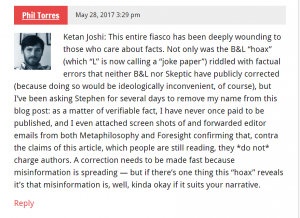Passive-aggressive non-retraction retraction
How “skeptics” operate.
Stephen Knight aka Godless Spellchecker wrote a post on May 25 about the reception of the Boghossian-Lindsay “hoax” that wasn’t really a hoax but rather a not very good satire. His focus is on the pay to publish issue.
I took a look at the journals where PZ Myers, Ketan Joshi, Phil Torres (Philippe Verdoux), and Amanda Marcotte published to see if their paper had ever appeared in pay-to-publish journals. While we do not know the details of how much they paid to have their articles published, or even if they paid at all, below is a list of the journals and their fees where their articles have appeared.
To be clear: I do not know if they (or someone on their behalf) paid publication fees or not. Here is my direct question to these individuals: “Have you ever paid, or had anyone pay on your behalf, a fee for publishing a paper or papers?”
…
Phil Torres (Philippe Verdoux)
Metaphilosophy
Verdoux’ article: Emerging Technologies and the Future of Philosophy
Foresight
Verdoux’ article: Technology and our epistemic situation: what ought our priorities to be?
Now scroll down to the end of the comments to read this:
Phil Torres May 28 3:29 pm
Ketan Joshi: This entire fiasco has been deeply wounding to those who care about facts. Not only was the B&L “hoax” (which “L” is now calling a “joke paper”) riddled with factual errors that neither B&L nor Skeptic have publicly corrected (because doing so would be ideologically inconvenient, of course), but I’ve been asking Stephen for several days to remove my name from this blog post: as a matter of verifiable fact, I have never once paid to be published, and I even attached screen shots of and forwarded editor emails from both Metaphilosophy and Foresight confirming that, contra the claims of this article, which people are still reading, they *do not* charge authors. A correction needs to be made fast because misinformation is spreading — but if there’s one thing this “hoax” reveals it’s that misinformation is, well, kinda okay if it suits your narrative.
Now, Knight did insert an update at the top of the article:
Phil Torres has contacted me by email: “I can honestly affirm that I have never paid to publish an article”. He is working on a follow-up article which I shall link to here when it is published.
I think it’s pretty obvious how insultingly inadequate that is.
“Skeptics” – ugh.


The logic seems to be: “Sure, the specific details may be untrue — those whom we claimed to have done XYZ did not really do XYZ — but the actors in the drama represent a real problem (by “real problem”, I mean a problem I suspect is there)… so we are justified in pretending that the claims are true as presented since our pretense serves a greater moral cause of orienting us to think in the right direction.”
Jerry Coyne actually said that in a comment on one of the early posts pointing out the flaws in the “hoax.”
On Henry Farrell’s post at Crooked Timber.
Pretty much the antithesis if scepticism and utilisation of ration or logic. Oh well, I guess it proves they’re just as human as the rest of us misguided and blinded by confirmation bias fools.
Did he say that? That is surprisingly similar to the reason traditionally given by the Roman Catholic Church for handling all misdemeanours committed by the clergy internally and pretending publicly that they did not happen. Namely that, although to do so is morally problematic, it is surely a greater moral evil for people to be led astray (i.e. away from the Holy Mother Church) by knowledge of the truth.
James Linsday was interviewed for the latest episode of the podcast Serious Inquiries Only (formerly Atheistically Speaking). This was after the host, Thomas Smith, had on Eli Bosnick, and they showed why this whole thing is a mess of ideology and quite possibly dishonesty. In my opinion, Lindsay’s replies to Smith’s challenges were a hodgepodge of non-answers, contradictions, and goal-post-moving. After the interview, Lindsay sent Smith a list of academic articles that supposedly show the problems plaguing gender studies, which Smith went on to dissect in the podcast with properly ruthless honesty, and a humility about being unversed in the field. Lindsay’s list proved nothing, and was clearly the work of someone who didn’t know what they were talking about.
Lindsay said repeatedly to Smith that he considers gender studies an important field (though currently flawed due to, all together now, “postmodernism, postmodernism, postmodernism”). His actions belie his words.